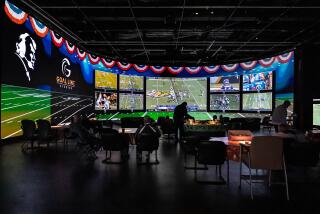OK of Instant Replay Is a Present for Rozelle
- Share via
PALM DESERT — When the owners of the National Football League’s 28 teams arrived here last weekend, the chance for instant replay officiating this fall was as dead as the desert surrounding their convention oasis.
At least 12 owners had lined up against renewal and only eight were needed to kill it.
But Commissioner Pete Rozelle was for it.
And at Thursday’s final session, as Rozelle presided for the last time at these winter meetings, the owners decided, 24-4, to keep instant replay for another year.
“(They) acquiesced to the wishes of the commissioner,” Raider owner Al Davis said afterward. “And that was only fitting.”
Rozelle, who resigned suddenly Wednesday in his 30th year in charge, was asked if he considered the vote a farewell present.
“We might have got it (without the resignation),” he said. “But it was easier this way.”
Actually, the last chapter in a week of wrangling over instant replay brought a typical Rozelle compromise.
He and most of the members of the competition committee were pressing for the adoption of TV replays as a permanent feature of NFL officiating.
They were also pressing for a recently perfected technological improvement--a method of instantaneously transferring the sound of the officials’ whistles to the replay screen.
“But this (technology) would have been too costly for some teams,” Davis said.
And with a permanent instant-replay rule, the 12-team minority would lose its privilege to dominate the majority. A permanent rule requires 21 votes to overturn, not eight.
Rozelle decided in the late morning to try for two-thirds of a loaf.
“If we make (instant replay) for another one year only, and if we throw out the whistle (technology), who’s for it?” he asked the owners. “Let’s have a show of hands.”
When 21 hands went up, Rozelle said: “Motion carried.”
For the last three decades, under a commissioner who was 33 when he started in 1960, the NFL has been doing business that way--seldom pleasing everyone, but seldom really angering anyone, either.
The minority teams, as usual, were allowed to change their votes before the result was etched in the book. That left as the opposition only the four hard-core dissenters, the Cincinnati Bengals, New York Giants, Phoenix Cardinals and Tampa Bay Buccaneers.
Rozelle was asked what he had enjoyed the most about the last 30 years.
“Watching the development of the Super Bowl,” he said. “We bombed, you know, with the first one (in 1967) in Los Angeles. We couldn’t sell it out at $7.50. But in (recent years), I’ve felt a high--to use a term--each Sunday of the Super Bowl.”
Who was the greatest player of your time?
“In the last decade, it was probably Walter Payton--his playing ability and as a person.”
Your biggest regret?
“Playing those games on Kennedy Sunday--the Sunday after President Kennedy died. My classmate, Pierre Salinger, (a close Kennedy associate), recommended that we play, but I wish I hadn’t. It has caused too much controversy.”
Why do you say the next 30 years will be greater for the NFL than your 30 years?
“Because of the impact the game will have internationally. With the expansion of teams and cable channels, it will become truly worldwide.”
What advice do you have for your successor?
“Stay loose.”
Rozelle said he started with the Rams in the 1940s at $5,500 a year as an assistant publicist. Thereafter, his salary doubled on each rung as he went up the ladder, to $12,500 as public relations director of the Rams, to $25,000 as their general manager, and to $50,000 as commissioner in 1960.
He is giving up a salary of $1 million now to move into retirement in California, where he and his wife Carrie plan to build their new house on a two-acre parcel they own at Rancho Santa Fe.
As the owners considered the possibility of hiring two persons for Rozelle’s job this time, he brushed off two related questions.
“I haven’t thought about (it),” he said first.
Then, when asked why he hasn’t participated as an arbitrator or adviser in the NFL’s lengthy, current labor war, he said: “That’s not my function.”
Some football people, including the Raiders’ Davis, think it is.
“(Rozelle) has the power to get in there,” Davis said.
But most owners agree with Rozelle that an NFL labor fight is between them and the players, and that the commissioner lacks a constitutional mandate to intervene.
Indeed, that is a primary reason why, henceforth, some of them want an NFL president as well as a commissioner.
In the present labor fuss, the owners’ side of the argument is being carried by the management council, whose director is Jack Donlan.
The players object to this arrangement, arguing that Donlan is too far removed from the owners to be speaking for them.
An NFL president, on the other hand, would have the prestige as well as the power to bargain with the players--and with the television networks as well, among other businesses--leaving the new commissioner to take charge in such areas as morals, integrity and discipline.
Art Modell, president of the Cleveland Browns, sees it about that way. Lamar Hunt, president of the Kansas City Chiefs, said he’s heard all that but is still open-minded.
Modell and Hunt were named to the committee to search for a new commissioner, as were Wellington Mara, president of the New York Giants; Dan Rooney, president of the Pittsburgh Steelers; Ralph Wilson, president of the Buffalo Bills, and Judge Robert J. Parins, retiring president of the Green Bay Packers.
Spokesmen for some of the younger, newer owners objected immediately that this is an old-guard committee.
More to Read
Go beyond the scoreboard
Get the latest on L.A.'s teams in the daily Sports Report newsletter.
You may occasionally receive promotional content from the Los Angeles Times.










